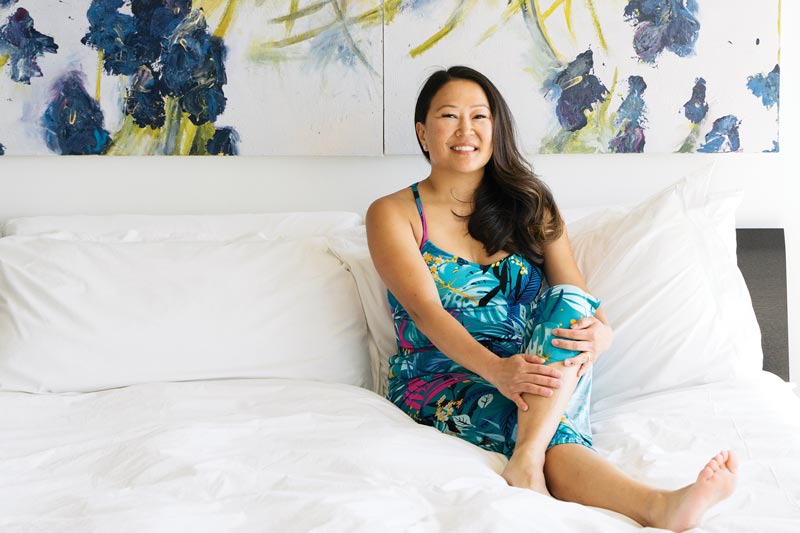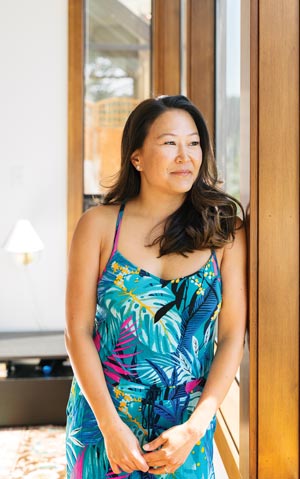the guru’s guide to better sleep
Meet Bellevue Club member Meredith Broderick, MD, a triple-board-certified physician who wants to help you get more z’s.
Meredith Broderick, MD, understands sleep disorders on a deep level. “Between myself and my family, I have experience with almost all of them,” she says.
At a young age, she had her tonsils removed for chronic snoring. Her brother had extreme bouts of sleepwalking that put him at great physical risk. And through the years, waxing and waning insomnia has plagued a few of her loved ones. She has seen and felt, firsthand, the effects these issues can have on health and wellness.
“Lack of sleep is very strongly connected to heart disease, but it’s also about living our fullest lives and longest health spans. Sleep can help you feel not just alive, but it allows you to live with vigor,” Broderick says.
 Little did she know, these experiences would eventually help inform her decision to practice sleep medicine and start Sound Sleep Guru, her private practice. When she first started in medicine as a young student, she was simply fascinated with the human brain. “The brain is so interesting; it’s what makes us human,” she says. So she chose to study neurology at the Case Western Reserve University.
Little did she know, these experiences would eventually help inform her decision to practice sleep medicine and start Sound Sleep Guru, her private practice. When she first started in medicine as a young student, she was simply fascinated with the human brain. “The brain is so interesting; it’s what makes us human,” she says. So she chose to study neurology at the Case Western Reserve University.
“At that time, I worked with a lot of patients that had had strokes and other devastating neurological diseases in neurointensive care. But it became very heavy on my heart, and I hadn’t expected that,” Broderick says. “I decided I wanted to do something to help people prevent getting to that point.”
Turns out sleep medicine gave her that option, so she pivoted. In 2007, she attended Stanford University and received a sleep disorders fellowship, and she was on her way.
“Behavioral sleep medicine is usually practiced by a psychologist, but I’m lucky that where I trained, they used all of the approaches,” Broderick says. “So I can offer behavioral solutions as well as allopathic [pharmacological] treatment. I wanted the whole picture. I wanted both perspectives because, in reality, they are synergistic.”

Equipped with a passion, curiosity, personal experience and tons of training, Broderick opened her practice to help people get at the root cause of some of their chronic issues. She believes lack of sleep can be a key factor to many modern wellness problems, including brain fog, depression, anxiety, high blood pressure, decreased physical performance and more.
And given the current statistics surrounding sleep disorders, she has her work cut out for her. One out of three people will have insomnia at some point in their life, and most will likely experience it off and on throughout life. “In people 65 and over, 50 percent have sleep apnea. Four percent of women and 12 to 15 percent of men have obstructive sleep apnea,” she says.
In order to combat these numbers, Broderick embraces the latest technologies in the field. One of her favorite tools is actigraphy—a wearable device that looks like a watch but does much more than the average watch, tracker or app. It measures sleep, resting periods, wakefulness, and intensity of light and darkness exposure, then creates visual representations for what’s happening during the entire 24-hour cycle.
“You need to know about wake activity just as much,” she says. “It really helps to optimize sleep and allows you to perform at your best.”
Another huge benefit is that the actigraphy technology is easily incorporated into her telehealth-based business practices. “I didn’t love telehealth prior to COVID, but now I feel like since behavioral treatments are a series of appointments it’s hard for people to take off work, drive or travel to see me. It makes help so much more accessible,” she says.
And that’s her main goal, to give the gift of good rest to as many people as possible.
Sleep Like a Guru
Here’s how Dr. Broderickgets good rest:
1. Environment is everything. I don’t have a TV in my bedroom, and I keep my bedding very minimal (all white), easy and clean.
2. I have blackout shades. Seattle does have a pretty extreme light difference during certain seasons. People tend to think places like Alaska are extreme, but we are here, too.
3. Get bright light first thing in the morning and midday. Most people don’t get enough midday light. Our body is meant for an increase in light that peaks at noon and then drops to signal certain processes in the body.
4. Don’t sleep in on weekends. I call it social jet lag, and it used to be a problem for me. Stick to your schedule as much as possible.
5. Get off your phone. My biggest hurdle right now is shutting down everything, especially my phone. But you have to force yourself to do it.
6. Get good exercise. It helps your brain generate deep sleep when you work out, plus all the other metabolic benefits.
7. Use orange bulbs in bedside lamps. Orange bulbs reduce exposure to blue lights.


